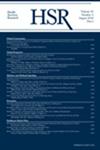The business case for hospital mobility programs in the veterans health care system: Results from multi‐hospital implementation of the STRIDE program
IF 3.1
2区 医学
Q2 HEALTH CARE SCIENCES & SERVICES
引用次数: 0
Abstract
ObjectiveTo conduct a business case analysis for Department of Veterans Affairs (VA) program STRIDE (ASsisTed EaRly MobIlization for hospitalizeD older VEterans), which was designed to address immobility for hospitalized older adults.Data Sources and Study SettingThis was a secondary analysis of primary data from a VA 8‐hospital implementation trial conducted by the Function and Independence Quality Enhancement Research Initiative (QUERI). In partnership with VA operational partners, we estimated resources needed for program delivery in and out of the VA as well as national implementation facilitation in the VA. A scenario analysis using wage data from the Bureau of Labor Statistics informs implementation decisions outside the VA.Study DesignThis budget impact analysis compared delivery and implementation costs for two implementation strategies (Replicating Effective Programs [REP]+CONNECT and REP‐only). To simulate national budget scenarios for implementation, we estimated the number of eligible hospitalizations nationally and varied key parameters (e.g., enrollment rates) to evaluate the impact of uncertainty.Data CollectionPersonnel time and implementation outcomes were collected from hospitals (2017–2019). Hospital average daily census and wage data were estimated as of 2022 to improve relevance to future implementation.Principal FindingsAverage implementation costs were $9450 for REP+CONNECT and $5622 for REP‐only; average program delivery costs were less than $30 per participant in both VA and non‐VA hospital settings. Number of walks had the most impact on delivery costs and ranged from 1 to 5 walks per participant. In sensitivity analyses, cost increased to $35 per participant if a physical therapist assistant conducts the walks. Among study hospitals, mean enrollment rates were higher among the REP+CONNECT hospitals (12%) than the REP‐only hospitals (4%) and VA implementation costs ranged from $66 to $100 per enrolled.ConclusionsSTRIDE is a low‐cost intervention, and program participation has the biggest impact on the resources needed for delivering STRIDE.Trial Registration退伍军人医疗保健系统中医院流动计划的商业案例:多医院实施 STRIDE 计划的结果
目标对退伍军人事务部(VA)的 STRIDE(ASsisTed EaRly MobIlization for hospitalizeD older VEterans)项目进行商业案例分析,该项目旨在解决住院老年人行动不便的问题。我们与退伍军人事务部的业务合作伙伴合作,估算了在退伍军人事务部内外实施项目以及在退伍军人事务部内促进全国实施所需的资源。这项预算影响分析比较了两种实施策略(复制有效计划 [REP]+CONNECT 和仅复制有效计划)的交付和实施成本。为了模拟全国的实施预算情况,我们估算了全国符合条件的住院人数,并改变了关键参数(如注册率),以评估不确定性的影响。数据收集从医院收集了人员时间和实施结果(2017-2019 年)。主要发现REP+CONNECT的平均实施成本为9450美元,仅REP的平均实施成本为5622美元;在退伍军人医院和非退伍军人医院环境中,每位参与者的平均计划交付成本均低于30美元。步行次数对交付成本的影响最大,每位参与者的步行次数从 1 次到 5 次不等。在敏感性分析中,如果由理疗师助理进行健走,每位参与者的成本将增加到 35 美元。在研究医院中,REP+CONNECT 医院的平均注册率(12%)高于仅有 REP 的医院(4%),VA 的实施成本从每位注册者 66 美元到 100 美元不等。结论STRIDE 是一种低成本干预措施,项目参与对实施 STRIDE 所需的资源影响最大。前瞻性注册于2017年10月3日。
本文章由计算机程序翻译,如有差异,请以英文原文为准。
求助全文
约1分钟内获得全文
求助全文
来源期刊

Health Services Research
医学-卫生保健
CiteScore
4.80
自引率
5.90%
发文量
193
审稿时长
4-8 weeks
期刊介绍:
Health Services Research (HSR) is a peer-reviewed scholarly journal that provides researchers and public and private policymakers with the latest research findings, methods, and concepts related to the financing, organization, delivery, evaluation, and outcomes of health services. Rated as one of the top journals in the fields of health policy and services and health care administration, HSR publishes outstanding articles reporting the findings of original investigations that expand knowledge and understanding of the wide-ranging field of health care and that will help to improve the health of individuals and communities.
 求助内容:
求助内容: 应助结果提醒方式:
应助结果提醒方式:


